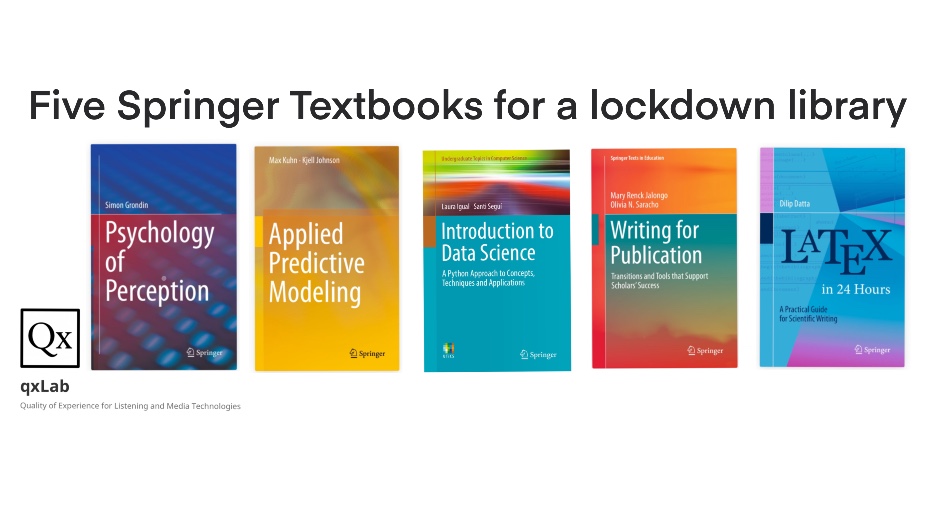
The lockdown has taken away many of our social and leisure opportunities, restricted our travel and our ability to teach and learn in a natural, face-to-face environment. As we struggle to find the headspace to work and draw virtual lines to separate or home and work lives, a few welcome gifts have arrived.
Many companies have provided free or extended access to their online resources such as video streaming services, kids education resources and learning software.
From an academic perspective, the Springer book series that has been made available has provided a new bookcase on my tablet of introductory texts across a range of topics. After a discussion on our lab group #random slack channel, a few books were suggested so I’ve put together a post of the top picks.
For those interested in working in the area of Predictive Modelling for Multimedia Quality of Experience, I’ve put together a top 5 books bootstrap your productivity. New PhD students at QxLab will find this a good place to start.
- : This book the terminology used in perception and the biological and physical bases required for understanding sensory experiences. The chapter on hearing introduces speech and audio perception touching on phonemes, psychoacoustics and musical notes.
- The different ways of implementing regression and classification models are presented. Chapter 20 is a nice introduction to the factors that can affect model performance, highlighting how models may predict something other than the factor you expect.
- : Getting familiar with the syntax and libraries of Python, Pandas, Numpy and Scipy through Jupyter Notebooks. Data understanding, preparation and wrangling is the foundation of any good data-driven model so this book gives a good crash course. Especially useful if you come from a MATLAB background and want to get up to speed with Python.
- : Procrastination, aversion to writing, uncertainty and fear of criticism impact us all throughout our research careers so any book that deals with these in chapter one before getting into the difference between conference and journal publications seems good to me. From the benefits of collaborative authorship, to dealing with editors it has a lot of nice tips regarding academic writing that go beyond the concrete advice on first drafts, titles, abstracts etc. which are also covered.
- : Learning to use LaTeX is the best way to increase the efficiency of academic writing. Managing citations with BibTeX beats word any day, but using Overleaf for collaborative authoring, commenting and markup for revisions and version control makes it the markup language of academic writing. I never had a book on LaTeX and as with anything the you learn as you go, it is nice to be able to dip in and see chapters containing simple things you’ve never come across before (e.g. chapters 17 and 18 has lots about boxes).
I’ve saved these to iBooks on my iPad so next time I’m looking for a book to browse I have several options at hand.
